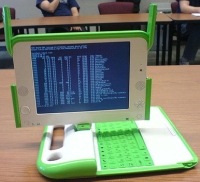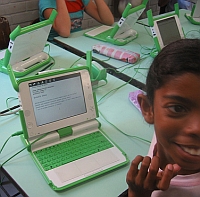What was your initial reaction to the OLPC production news, reported by Digitimes that:
Quanta Computer's shipments of XO notebooks under the OLPC (One Laptop per Child) project may be delayed, again, to the fourth quarter instead of the third quarter due to a delay in designs of varied application scenarios for different emerging markets[...]If you are one of the Children's Machine XO component suppliers, or an OLPC supplier investor, you are not happy. In fact, you could be downright angry since InfoWorld reports the delay might be caused by OLPC itself:Quanta has not yet released its orders for parts and components needed for the OLPC notebooks, indicating that Quanta will not be able to start shipping the low-cost notebooks in July as scheduled.
Quanta Computer, the world's largest contract laptop PC manufacturer, had earlier predicted shipments could start as early as July, but software adjustments by the OLPC group have pushed the schedule back to the third quarter. "The hardware is pretty much in place," a company representative said.And why might the OLPC leadership be slowing production? I hope the delay can be attributed to the need to finish three very simple yet massive activities facing the project before large-scale production starts: fully-developed software, sufficient user testing and a defined implementation plan.
If you follow the developer or Sugar listervs, you'll see that the base operating system, including the Sugar UI is still very much in development. The teams are making quick and steady progress, but there is much work to be done before the OS is fully baked enough for a million children to start effectively learning in the developing world.
Next up, OLPC has yet to do much user testing with those very children. A classroom in Nigeria and a few in Brazil using BTest-2 machines does not make a valid field test for a one million unit rollout. I would hope to see at least a school year of rigorous testing with production-level hardware and software in several schools in more participating countries first.
Last but not least, One Laptop Per Child still lacks a defined implementation plan to manage that million unit distribution. Thankfully, it seems that OLPC is starting to focus on the most critical part of this project, deployment. Mary Lou Jepsen was quoted in The Soul Of a New Laptop saying:
And One Laptop Per Child hasn't figured out yet how to get the laptops to all those kids. "We need to think about deployment as creatively as we thought about the hardware and the software," says Jepsen.And they don't have a moment to waste, even if the rollout is delayed.
But wait, might there be a more problematic production delay: country-level Children's Machine XO commitments? Lorenz Matzat, a freelance journalist, suggests the delay of the production start could be due to the still missing financial commitment of enough governments:
OLPC said from the beginning, that they only will start the production when there are at least five million orders for the laptop. But which country besides Libya is really willing to provide the funds? As could be read here Quanta has already said it has confirmed orders for 1But not 5 million units - a significant difference that calls into question OLPC's oft-repeated Argentina, Brazil, Nigeria, Rwanda, and Uruguay commitments.
million of the laptops.
No matter the delay, I still believe it is for the good of the program. One laptop for five million children in the developing world is a very ambitious goal, and OLPC will need every day between now and whenever they start production to ensure educational success.





The OLPC is on a tight shedule. Your proposed delays for testing would kill it.
The low price needed to make the machines available to the third world require massive scales. 10 million is the minimum I think. Shipping and distributing the machines is expensive, so large shipments are needed to keep the unit price low.
To get this number of machines produced in short order, large production facilities are needed. These facilities will be redeployed if the delay is large. Redeployed, they will not become available to produce 2b1 machines again. In that case, there will be NO 2b1.
Furthermore, components age fast. In 18 month, they will not be available anymore, and a new design has to be made at very great cost.
If the OLPC wait a year, that is the end.
The Classmate or other "standard" PCs are useless:
- They are not build to be operated by small children at home
- They need a much better infrastructure wrt power and network access.
- Their security is really bad and would result in 10 million zombie bots.
- They might even be dangerous to the children as targets of phishing, identity theft, laptop theft (the 2b1 has hardware anti-theft measures), and shudder when you think of millions of children behind unsecured PCs with a cam-corder and an address (see identity theft).
- Data security and backup would be next to absent.
- We know how good standard Western educational software is: MS Office training courses are about the pinnacle of what many children see in school.
So, a real, 1 year delay, would just kill the OLPC with no replacement in sight.
The choice is, between deciding the OLPC is worth a try, or to just cancel it. A delay is the same as canceling.
Rob
Rob,
I am all for the OLPC rolling out in limited batches of production-level machiens for testing asap, to ensure that a larger rollout to follow, is successful.
The worst reason to rush software, skip testing, and dump 5 million computers (the minimum amount they speak of, not 10 million) into unprepared schools is a production schedule based on a price OLPC still hasn't achieved.
Indebting countries by factors of at least $150 million should not be a snap decision based on "worth a try" but founded in objective metrics and solid planning.
http://www.pcmag.com/article2/0,1895,2120985,00.asp
A representative from the One Laptop per Child (OLPC) initiative confirmed on Friday that notebook shipments will be delayed until the fourth quarter of 2007.
The representative denied that the hold up was in any way related to Quanta Computer, the company manufacturing the XO notebooks, and instead cited OLPC-initiated design changes that are being made to improve the notebook's performance.
The current target date for notebook shipments is now mid-September, according to the OLPC.